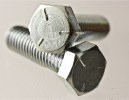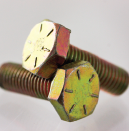Finishes/Plating
| Plating Description | Color/Appearance | Specification |
Coating Thickness Minimum (Microns/Inch) |
Salt Spray Life | RoHS | Remarks | ||
| White Rust Hours | Red Rust Hours | |||||||
|
|
As received bare metal, varies from silver, gray, to black tones | N/A | N/A | N/A | YES | Typically provided with a rust inhibitor like oil. | ||
|
|
Black in color with some varitions | N/A | N/A | N/A | YES | This is more of surface finish that is formed during the heat treatment process where parts are being quenched and tempered. Little or no corrosion resistance. | ||
|
|
Black in color | ASTM D769 | N/A | N/A | YES | Inexpensive finish. No embrittlement issuse. Great pre-treatment for painting. Very thin and adds no more than 5-10 millionths of an inch to the dimensions of the part. Little or no corrosion resistance when applied to carbon steel. | ||
|
|
Flat black or gray in color | ASTM F1137 Grade C | N/A | N/A | 24 | YES | Black phosphate coating, on its own does not provide any corrosion resistance. Oil. sealers or paint is needed to achieve corrosion resistance. Majority of the phosphate coatings serve as a surface preparation for further coatings or paint. | |
|
|
Silver in color | ASTM F1941 Fe/Zn 3AT | 3 microns/0.0001" | 3 | 12 | YES (Cr+3) | High strength fasteners will require a baking process to draw out Hydrogen and reduce the risk of embrittlement failures. | |
| ASTM F1941 Fe/Zn 5AT | 5 microns/0.0002" | 6 | 24 | |||||
| ASTM B633 Fe/Zn 5 SC1 (Mild) Type III | 5 microns/0.0002" | 12 | 12 | |||||
|
|
Yellow in color | ASTM F1941 Fe/Zn 3C | 3 microns/0.0001" | 24 | 24 | NO (Cr+6) | Same as the zinc clear above only the chromate contains yellow pigment as an identifier. Coating thickness being the same, yellow chromate will have better corrosion resistance than clear chromate. | |
| ASTM F194 Fe/Zn 5C | 5 microns/0.0002" | 48 | 72 | |||||
| ASTM F1941 Fe/Zn 5CT | 5 microns/0.0002" | 48 | 72 | YES (Cr+3) | ||||
| ASTM B633 Fe/Zn 5 SC1 (Mild) 5 Microns Type II | 5 microns/0.0002" | 96 | 96 | NO (Cr+6) | ||||
|
Zinc Electroplated and Black Chromated |
Shiny Black in color | ASTM F1941 Fe/Zn 3C | 3 microns/0.0001" | 24 | 24 | NO (Cr+6) | Same as the zinc clear above only the chromate contains black pigment as an identifier. Coating thickness being the same, black chromate will have better corrosion resistance than clear chromate. | |
|
|
Silver matte appearance | ASTM B695 Type II Class 5 | 5 microns/0.0002" | 72 | 72 | YES (Cr+3) | Process by which the fasteners are tumbled in a drum with glass beads, water, chemicals and zinc powder. The collision creates a cold welding of the zinc powder onto the parts. Advantages: Elimination of hydrogen embrittlement, excellent adhesion, uniformity of coating thickness. Ability to plate hardened parts without post baking. | |
|
|
Silver to gray in color | ASTM F2329 |
Up to 3/8" diameter: 43 microns / 0.0017" Above 3/8"diameter: 51 microns / 0.0020" |
N/A | N/A | YES | This is carried out by putting the fasteners in molten zinc and spinning off the excess zinc. Hot dipped galvanized parts can be used in ACQ treated lumber. | |
| ASTM A153 | ||||||||
|
|
Yellow in color | ASTM B766/QQ-P-416 Type II, Class 3 | 5 microns/0.0002" | 96 | 96 | NO (Cr+6) | Cadmium is a soft white metal which when electroplated onto steel acts as "sacrificial coating", corroding before the substrate material. It provides excellant corrosion resistance, good lubricity, solderability, and has good paint base characteristics. | |
|
|
Almost a chrome like finish | ASTM B689 | N/A | N/A | N/A | N/A | This is a thin layer of nickel deposited onto metal objects. Serving as a decorative and corrosion resistant finish. | |
|
|
Clear looking surface | As per manufacturer standard | N/A | N/A | N/A | N/A | Passivation of stainless steel fasteners is a cleaning process for removing the contaminants of foreign particles sticking to the fastener from the manufacturing process. If passivation is not carried out then it will affect the corrosion resistant properties if the stainless steel fasteners. | |

 Uncoated/Plain
Uncoated/Plain Thermal Black Oxide
Thermal Black Oxide Chemical Black Oxide
Chemical Black Oxide Black Phosphate
Black Phosphate Zinc Electroplated and Clear Chromated
Zinc Electroplated and Clear Chromated Zinc Electroplated and Yellew Chromated
Zinc Electroplated and Yellew Chromated Machanical Zinc
Machanical Zinc Hot Dipped Galvanized
Hot Dipped Galvanized Cadmium Yellow
Cadmium Yellow Bright Nickel Electrodeposited
Bright Nickel Electrodeposited Passivation of Stainless Steel
Passivation of Stainless Steel